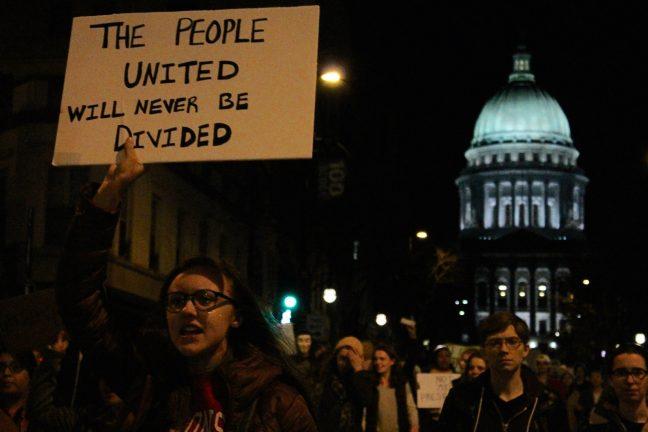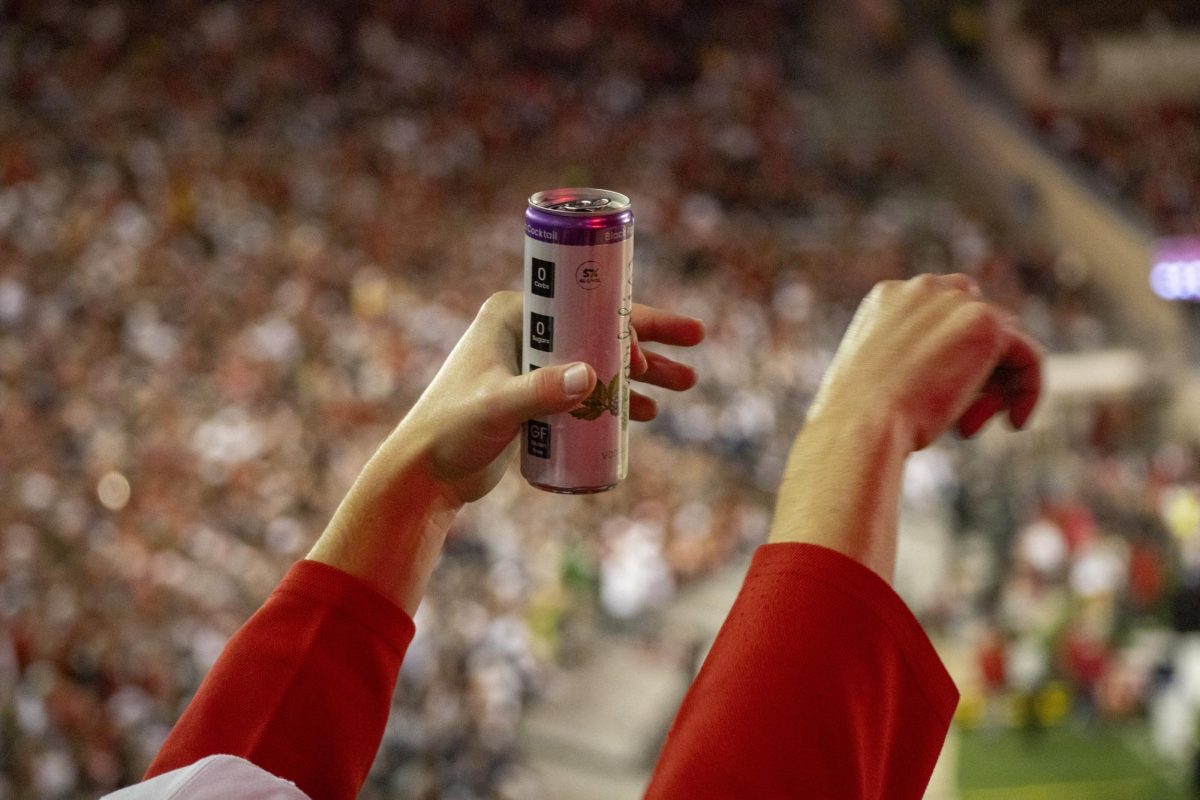More than a thousand University of Wisconsin students and Wisconsin residents gathered at the Capitol Thursday evening to protest sexual assault, President-elect Donald Trump’s marginalization of minority communities and neglect of women’s reproductive rights.
The protest, which began on top of Bascom Hill, initially started with 300 students but grew as it progressed down Library Mall and State Street. Chanting “not my president” and “Donald Trump has got to go,” students protested various policies Trump spoke about during his campaign for president.
UW junior Ella Sklaw was the first to speak and said she did not expect to see Trump elected. Calling it a “pretty tragic occasion,” Sklaw said Trump’s treatment of women and sexist comments could impact women nationwide. She said Trump’s policies could lead to a regression of women’s rights.
“But instead here I’m telling you we will not go back,” Sklaw said. “We will not destroy the progress the people we love have died for, and we will fight for continued support for reproductive rights.”
Trump won just 23 percent of the votes in Dane County but won an overall majority over former Democratic presidential candidate Hillary Clinton with 48 percent of the votes in Wisconsin.
Trump, Johnson sweep Wisconsin in historic night for Republicans
UW sophomore Matt Wulf said many students like himself do not know how to feel about the election’s outcome. But Wulf said this was the time for the community to stand up for minority groups and “not sit idly by.”
“I am privileged to feel numb and because of my privilege I’m not scared for my wellbeing,” Wulf said. “We must use our privilege to amplify voices of our peers and fight for their safety and rights.”
Sklaw said the United States should have a welcoming atmosphere, but Trump has not made it so. Trump’s plans to build a wall separating the U.S. from Mexico and to ban Muslim immigrants has alienated and incited fear among people belonging to these communities, Sklaw said.
Protesters chant to express solidarity between all communities regardless of race, ethnicity, sexual orientation, religion @BadgerHerald pic.twitter.com/kmuYnpdkN9
— Vidushi Saxena (@VidushiSaxena3) November 11, 2016
Sklaw said students can and will fight to protect the rights of Muslims, immigrants, LGBTQ+ people, black people and women. Protesters cheered and chanted “this is what democracy looks like” in response.
“Walls are not going to tear us apart, and whatever walls they build we will tear them down,” Sklaw said.
Protesters surrounded the Capitol and staged a lie in. They also held three minutes of silence after which they immediately began chanting “No Trump, no KKK, no racist USA.”
Protesters chant “No Trump, no KKK, no racist USA” outside the Capitol @BadgerHerald pic.twitter.com/nG27XuBGoS
— Vidushi Saxena (@VidushiSaxena3) November 11, 2016
Some Trump supporters also observed the protest, but there was no backlash between them and the protesters. One Trump supporter, Andrew Peterson, said he wanted to hear what protesters had to say and did not take offense to their messages. Instead, Peterson said this was an opportunity to engage in “civil discourse.”
Rep. Chris Taylor, D-Madison, said the protest is a sign of “unity” that reflects the kind of state and country people wanted to see. Calling Trump a “bigoted racist,” Taylor said students will play a key role in advocating for the issues that Trump has neglected.
“There is a path forward for justice and equality, and that path has created a movement that you are going to lead,” Taylor said.
UW sophomore Soren Hughes said it is important for students like himself to come out and voice their opinion. He said the kind of country that Trump will create is not what UW or Madison stands for, and students can change that. Kylie Jackson, a sophomore, said it was a great experience to see everyone come together to fight for and give recognition to important issues like race.
UW students road trip to Standing Rock protest site to feed protestors
Madison College sophomore Alondra Quechol said Trump was merely a catalyst that “woke us up” and pushed people of all communities to show their true colors. She said she cannot believe that people still need to protest for issues as basic as equal rights for everyone.
“We march as one today, tomorrow and there’s no freedom until we’re truly free,” Quechol said.
Alice Vagun contributed to reporting for this article.


















